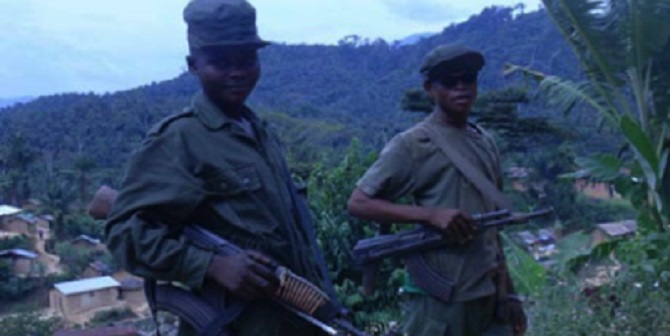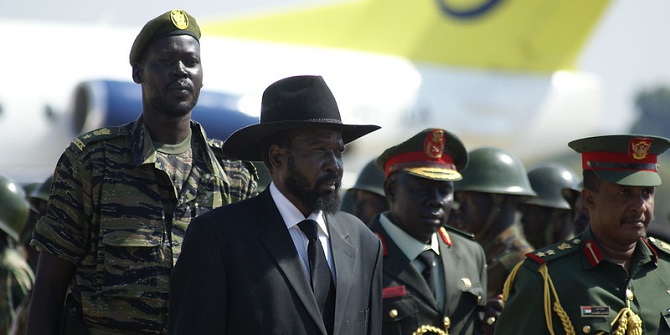“Srpska te zove” (“Srpska is calling you”). The name of the rally of the 18th April rally in Banja Luka, the capital city of the Bosnian-Serb entity of Bosnia-Hercegovina (BiH), left no doubt of the government’s intentions. President Milorad Dodik, the Republika Srpska (RS) autocrat who has waged a campaign threating secession for about a decade, used the set piece event to showcase popular support and mobilisation for a campaign heavily laden with genocide denial and ethnonationalism.
Buses transporting public sector workers to Banja Luka ensured a large attendance to the event which also gathered, in front of the entity’s parliamentary assembly, the most prominent local nationalistic figures as well as officials from Serbia, including ex-Prime Minister and now President of the National Assembly, Ana Brnabić . In front of some 9,000 people (though RS authorities claim five times more), a relatively low number given the institutional efforts to make it a mass event, guest speakers unleashed radical rhetoric, threatening to bring the RS leadership to Srebrenica in case the forthcoming UN resolution on the Srebrenica genocide was adopted; to pull out from the state-level institutions, hence making a step further in the RS authorities’ agenda to dismantle BiH; and to jump on the next opportunity available “to declare independence & union with Serbia”, directly referring to Trump’s possible victory.
After the rally, the Republika Srpska’s MPs walked the few streets that separate Trg Krajine, the central square where the the rally took place, from the Parliament. There began a parliamentary session that marks another step in the path to secession opened by Dodik when he returned to power as the entity’s Prime Minister in 2006, and worryingly accelerated from December 2021, when the RS’s National Assembly had a vote in favour of opting out of the Bosnian armed forces, judiciary, and tax system. On 18th of April, the Assembly went even further. First and foremost, it amended the 2010 Law on Referendum, removing institutional and organisational obstacles to holding new referendum. It also adopted a Law on Elections that enables the RS Electoral Commission to take over the management of local & entity-level elections as well as for state-level parliament, therefore going against the state’s electoral law.
The creation of parallel structures of governance does not only undermine the legitimacy and capacity of the state of Bosnia-Herzegovina, it also confers additional anchorage to the ethnocratic system firmly established in RS by Dodik and his party of Social-Democrats (SNSD), giving them full control over the decision-making process and increasing state (or rather entity)-capture by the kleptocratic clique that surrounds the RS President. It might come as a surprise for those who are not specialists of Bosnian politics, that such an unsettling chain of events could occur in a country that just opened accession talks with the EU, set to begin following the implementing of more reforms- an agenda that will be considerably hampered if RS officials pull out from the central institutions. Those of us who have been following closely Bosnian politics for the last decade have consistently pointed out how problematic, indeed dangerous, the revival of separatism and the consolidation of Dodik’s ethnicised authoritarianism could turn out to be for the sovereignty and security of Bosnia-Herzegovina as a whole.
In 2016, when the first referendum on the applicability of the Bosnian Constitutional Court’s decisions over the territory of Republika Srpska was held, this provocation was met with relative indifference from stakeholders of the peace process. At the time, I was working in the RS archives and conducting a political ethnography between Banja Luka and East Sarajevo that led me to meet several RS officials. What struck me at the time was, on one hand, the feeling of impunity they had when discussing the organisation of the referendum and, on the other hand, the poor understanding of the situation by representatives of European diplomacies and international organisations based in BiH. Dodik was seen as a mere troublemaker who could not do much harm and was still considered a legitimate leader to negotiate with, just like other politicians from nationalistic parties (Bosniak SDA and Croat HDZ) that rule over domestic politics in the country. As a result, in the following years, Dodik had full leverage to pursue his ethnocratic agenda and put the entity on the path to secession. Certainly, he benefited from a favourable geopolitical context. Within the EU, Orban has been relentlessly blocking any possible sanctions against the Bosnian-Serb leaders. Russia has been operating a very consistent and efficient sabotage of the peace implementation mechanisms (of which it stands as a third party member). At the UN, China sides with Russia and Serbia to block any resolution adverse to Republika Srpska’s interests, including in all likeliness the upcoming resolution on the recognition of genocide in Srebrenica.
So is anyone going to pick up Dodik’s call for mobilisation in favour of secession and the dismantlement of Bosnia-Herzegovina? Mass popular support from RS-based Serbs remains relatively weak and despite the government’s steady attempt at undermining civic participation in the entity, pockets of resistance to ethnonationalism and autocracy still stand and contradict the usual political apathy wrongfully attributed to Bosnian citizens by many scholars and policymakers. What makes the situation concerning though is the lack of awareness and preparedness from the European Union and its member states to face the issue, at a time when the US are not engaging in the region to the same degree as historically and when Russia and China are particularly active in securing local strongholds through economic investments (for the latter), patron-state politics and political warfare (for the former). The EU’s approach, which at times appears to consider ethnonationlists perfectly fine interlocutors to envision, design and implement Bosnia-Herzegovina’s democratic future has proven a significant policy failure.
The 18th April events should serve as a wake-up call. An ethnonationalist authoritarianism with a warmongering rhetoric cannot be the way forward for BiH. The EU must act to develop dialogue with civic movements and non-nationalistic parties instead. Its historical policy of pursuing top-down bargaining with ethnonationalist elites is failing the citizens of the region.





